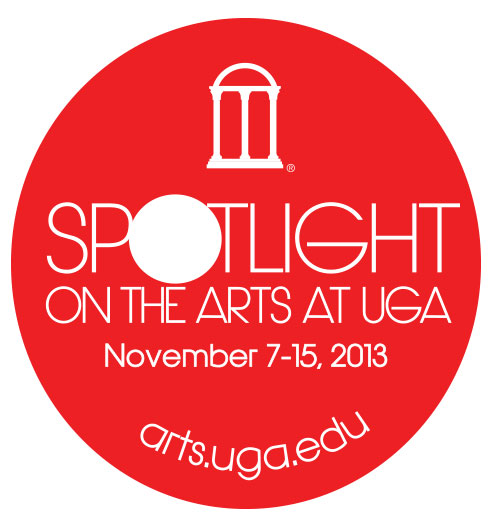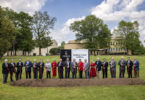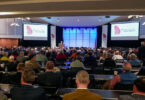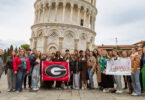When the UGA Arts Council—composed of directors and department heads from various arts units on campus—was convened by Vice Provost Libby Morris in fall 2011, discussions by the group immediately focused on how to make the arts at UGA more visible to the university community, especially students, and to the surrounding community as well.
“We talked about the fact that we have these marvelous arts programs and venues, but they needed a higher profile,” said Morris. “We discussed ways to raise awareness with various audiences on and off campus of the special opportunities that the university provides to experience the full spectrum of the arts—from music to dance to theater to the visual and literary arts.”
During spring semester 2012, a group of public relations majors in a PR Campaigns class taught by Meigs Professor Lynne Sallot in the Grady College of Journalism and Mass Communication researched what other colleges and universities were doing to promote the arts and also conducted focus groups with fellow students. The dismaying news was that many students were unaware that the state museum of art is located on campus, while others had no idea that student tickets to most events at the Performing Arts Center were available for only $5.
“It’s important that students—particularly our incoming students—learn about the opportunities available to them beyond the classroom,” said Provost Jere Morehead. “We hope that faculty, but particularly those teaching First-Year Odyssey seminars, will encourage students to visit the Georgia Museum of Art or attend a theater performance or dance or music concert on campus.”
Among the recommendations from the PR class to entice students to do that was to hold a campus arts festival, an idea readily embraced by the Arts Council units. Thus the Spotlight on the Arts festival was born.
“We started by identifying a week during fall semester when a few big events were already planned,” said Morris. “Once we had set the dates, then the council members began filling in other events and activities. It mushroomed to the point where we are now offering more than 50 events over the nine-day period of Nov. 3-11.”
To get word out about the festival—and about the arts in general—a State of the Arts newsletter was created and published in June, Twitter and Facebook pages were launched in July, and The Arts at UGA website followed in early August.
“While many of our individual arts units were doing an excellent job of promoting their own events and activities, there were no sources for overall information about the arts at UGA,” said Morris. “The idea was to make it possible for people to get an overview of all the university’s offerings in one place and then to be able to access more details about specific areas of interest.”
Other institutions around the country are also beginning to take that approach, according to the research conducted by the students. “In some instances, we found that universities are putting together strategic plans and ‘blueprints’ for the arts,” Morris said.
At the same time, the role of the arts in economic development has become a topic of interest nationally, regionally and locally. At a September meeting at the Lyndon House Arts Center, community leaders and members of local arts organizations heard presentations about the national Arts & Economic Prosperity IV study, in which a number of local groups participated. The results show that the arts are a self-reliant industry that pumps millions of dollars into the economy every year.
But beyond economic value, the arts are widely regarded as enhancing the quality of life in Athens-Clarke County. As President Michael F. Adams noted recently, “It’s not accidental that this community is on virtually every list of great places to live for everyone from millenials to retirees. A great part of that is the cultural life here in Athens. There are few if any places of 100,000 people in population in America where you have the breadth of art, music, dance and drama available to you that we have in Athens.”
The Spotlight on the Arts festival proves that point. See inside for a complete schedule of events and activities sponsored by the UGA Arts Council. In addition, several student arts organizations are planning “impromptu” performances at the Tate Center and in front of the Fine Arts Building at the corner of Baldwin and Lumpkin streets during the festival.
Click here for the complete schedule of events.








